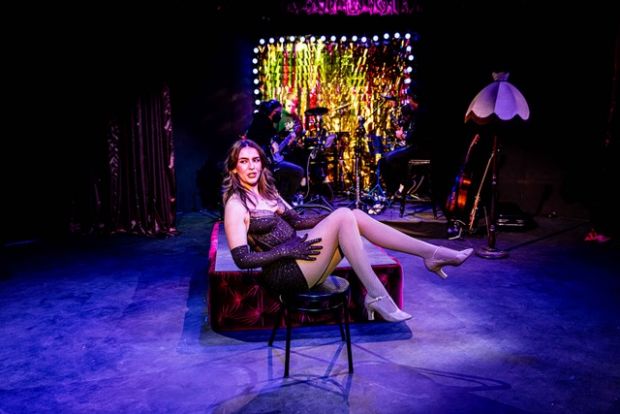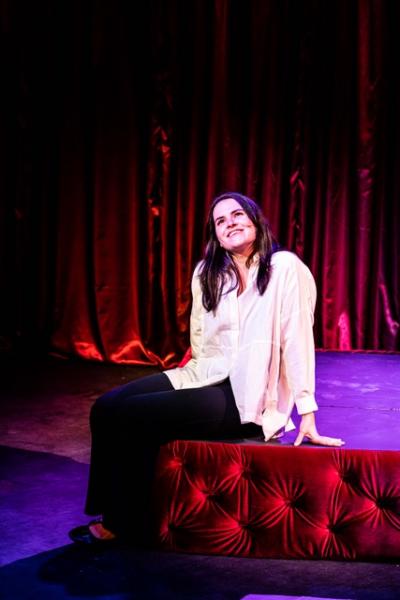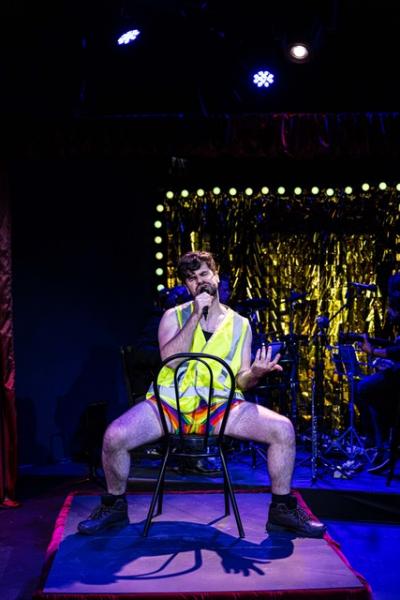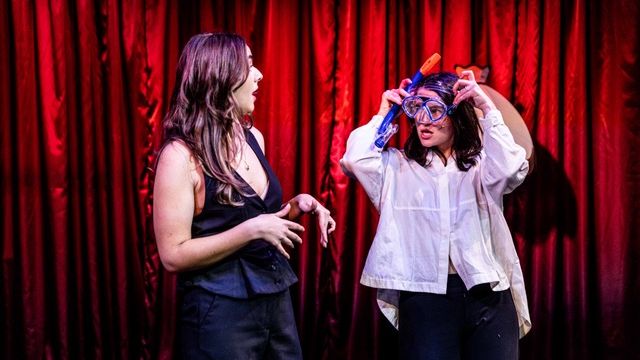Ugly Love
Writing a musical play is ambitious. Getting it on to the stage can be difficult. Doing both yourself can be … challenging, testing, tiring … especially during two years of pandemic-instigated illness and restrictions. But, if you are as determined and resolute as Lucy Matthews, it can also be exhilarating.
That exhilaration, that feeling of “we’ve done it despite everything, and we’ve loved it” shines in this production. Regardless of its title, there is a lot of ‘good’ love here. It glows in Matthews’ face as she greets patrons – and it shines from the actors and musicians who are bringing her production – and its complex messages about connections – to the stage.
Matthews’ characters tell their story in short, well written scenes that are elaborated in musical dialogues in a variety of genres. As director, she has chosen not to complicate the story with complex choreography, allowing the lyrics and the way they are sung give greater depth to the emotional dilemmas the characters are facing and the ‘ugly’ hurt of love – especially changing love.

Ugly Love is a musical play that looks at love and polyamory through contemporary eyes. It looks at the predictability and ennui of any long-term relationship, the difficulty of discussing problems truthfully, the excitement of new love … and the quandary of a different sort of love. Matthews does all of this gently, without recrimination or moralising. She cares for her characters and their dilemmas, as she explains:
“I spent four years trying to find an ending for the play. Initially, I wanted a happy ending, something that shines a light on the positive side of polyamory … Rather than trying to make it happy, I asked “what has changed?” Change isn’t happy or sad. It simply is.”
The theatre space at Flight Path is small, its intimacy lending itself to a production such as this. Though the space allocated to the musicians is small, the ‘cosiness’ is effective, especially in the cabaret scenes. It does have to be said, however, that in some numbers the volume of the music can overwhelm the vocals, a difficulty when the lyrics are a continuation of the story.
Matthews uses four actors to play the seven characters. This is an effective device, especially during a time when social distancing, mask-wearing and a nasty virus is affecting rehearsal schedules. It can, however, be challenging for an actor, especially if the roles explore similar aspects of a character type.

Lincoln Elliott faces this challenge playing three roles in Ugly Love. He plays Sam, married to Jess, Gus in a relationship with Jess’s friend Maddie – and James, a cabaret singer. At times he must move between the characters quickly, and he uses changes of costume and attitude to flag the changes physically. The predominant of these characters is Sam, and it is as Sam that Elliott is most engaging and multi-layered.
It is Sam’s marriage that begins to dissolve when his wife Jess is attracted to a woman and suggests that they should become polyamorous. Elliott takes Sam through a range of reactions and emotions – acceptance, loneliness, anger, despair, even a form of grief – all in a short time and often portrayed in song, challenging enough in itself, without having to morph to into a second and third character between scenes. Elliott is to be congratulated in sustaining the integrity of all roles.
LJ Wilson is Jess, torn between long love and new love, between vows and liberation, between security and change. Wilson finds all the ramifications intrinsic to these choices in a performance that is emotionally convincing and engagingly sincere. Whether in heartfelt scenes with Sam, or the diffident insecurity of the developing relationship with Lola, Wilson shows the turmoil that Jess faces – whether in tentative, poignant dialogue or song.
Cypriana Singh plays Lola, the sexy cabaret singer-cum-barista who wins Jess’s heart. Singh is an accomplished performer who uses the stage confidently. The Lola she creates is self-assured yet empathetic, finding the gentle humour and understanding that Matthews has written into the character, in both the new relationship with Jess – and with “her other partner” Michelle, played by Madelaine Osborn.
Osborn is both Michelle – the conscientious, ambitious IT expert with whom Lola has a long-standing relationship – and Maddi, Jess’s best friend and confidante. Osborn makes the change between these roles smoothly. Both are clearly delineated and charmingly likeable. As Michelle, she is busy yet affectionate, loving but self-contained. As Maddi she is open, out-going, candidly blunt at times – especially when trying to deal with Jess, Sam, and her own faltering relationship with Gus.

Matthews brings these characters together in a production that is simply set, one that relies inherently on the ability of the actors to portray the emotional transformations that occur. Doing so in words and song works effectively, especially when the music – played by Dom Parker, Charlie George, Jhoan Sebastian Bonilla and Mike Mills – is such an integral and integrated part of the production.
There are twenty musical scenes in Ugly Love, including the title song, all of which progress the story. Some are emotional, some are amusing. “The Dating Song” is the one that stays in my memory. It involves all performers, is perceptively satirical and the was choreographed to enhance the satire.
Matthews has every right to glow!
Carol Wimmer
Photographer: Katje Ford
Subscribe to our E-Newsletter, buy our latest print edition or find a Performing Arts book at Book Nook.

